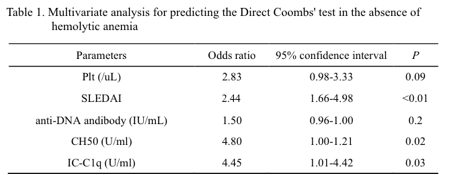Session Information
Date: Sunday, November 5, 2017
Title: Systemic Lupus Erythematosus – Clinical Aspects and Treatment Poster I: Biomarkers and Outcomes
Session Type: ACR Poster Session A
Session Time: 9:00AM-11:00AM
Background/Purpose: Direct Coombs’ test in the absence of hemolytic anemia was newly included in the immunologic criterion of the SLICC/ACR 2012 criteria for SLE. Since erythrocyte complement receptor contributes to the clearance of circulating immunocomplex, the direct Coombs’ test in the absence of hemolytic anemia may indicate excessive immunocomplex production. In this study, we determined its clinical significance in Japanese SLE population.
Methods: Patients who fulfilled SLICC/ACR classification criteria of SLE and visited St. Marianna University Hospital during Jan to Nov 2016 were prospectively evaluated with direct Coombs’ test. Hemolysis was defined as lower haptoglobin concentration than the normal limit. Clinical features including SLEDAI, treatment, and laboratory findings were examined. For patients with lupus nephritis class III or IV, we additionally compared renal pathological features and cumulative complete renal response (CR) rate between patients with positive result for direct Coombs’ test in the absence of hemolytic anemia and those with negative.
Results: Among 186 patients enrolled, 10 (5.4%) patients were positive with direct Coombs’ test in the absence of hemolytic anemia. They had higher SLEDAI (p<0.01), lower CH50 (p<0.01), higher anti-DNA titer (p<0.01) and lower cumulative CR rate (p=0.03) (Figure 1) comparing to those who were negative. In the renal pathological analysis, a significantly higher percentage of subendothelial deposit was determined in patients who were positive comparing to those who were negative (p=0.02). Multivariate analysis indicated that SLEDAI was the independent factor strongly correlated with the direct Coombs’ test (OR 2.44, 95%CI 1.66-4.98, p<0.01) (Table 1).
Conclusion: Direct Coombs’ test in the absence of hemolytic anemia might be correlated with high disease activity and poor renal response in SLE.
To cite this abstract in AMA style:
Hanaoka H, Iida H, Kiyokawa T, Takakuwa Y, Kawahata K. Positive Direct Coombs’ Test in the Absence of Hemolytic Anemia Predicts High Disease Activity and Poor Renal Response in Systemic Lupus Erythematosus [abstract]. Arthritis Rheumatol. 2017; 69 (suppl 10). https://acrabstracts.org/abstract/positive-direct-coombs-test-in-the-absence-of-hemolytic-anemia-predicts-high-disease-activity-and-poor-renal-response-in-systemic-lupus-erythematosus/. Accessed .« Back to 2017 ACR/ARHP Annual Meeting
ACR Meeting Abstracts - https://acrabstracts.org/abstract/positive-direct-coombs-test-in-the-absence-of-hemolytic-anemia-predicts-high-disease-activity-and-poor-renal-response-in-systemic-lupus-erythematosus/


